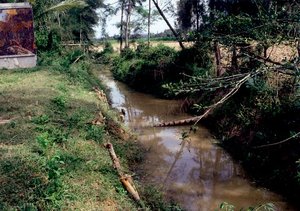
This is the picture of the infamous ditch at the My Lai Massacre site that I took when I and
three other Vietnam veterans went back to
Vietnam in March of 1994.
This ditch is where American soldiers herded
close to 100 Vietnamese civilians, and executed
them at point-blank range with automatic weapons.
Now, imagine this village being one of a thousand
villages that were bombed or received artillery rounds
throughout the Vietnam War.
One was done by air, My Lai was done with troops on
the ground.
The ones that were done by air strikes or artillery rounds
are what I call My Lais from the skies.
They may not have been 504 murdered, but they were
atrocities, and many times far exceeded 504 with major
B-52 carpet bombing.
They happened everyday during the Vietnam War.
You do not bring the enemy to the peace table by
just killing military combatants. You ultimately bring
the enemy to the peace table by killing innocent civilians.
They are military targets. This strategy is as old as
warfare itself.
The U.S. Government lied about this in Vietnam,
because lying is the most powerful weapon in war.
If one were to emotionally absorb this statement
about killing innocent civilians because they are
military targets, you can imagine what it did to
hundreds of thousands of Vietnam veterans when
they came home and had their core beliefs destroyed.
That is why denial is a sacrament.
The greatest lie of the Vietnam War is unspeakable.
I was in a military unit that had three fire bases that
had heavy artillery, and tanks that had 90mm guns.
God only knows how many rounds were fired by
those weapons during the lifetime that those weapons
were in Vietnam.
You wonder how many innocent Vietnamese were
killed while the U.S. exercised the insane policy of
free-fire-zones.
Deciding to remain on their ancestral homeland was
no excuse as far as the U.S. military was concerned.
You have personality disorders, and you have barbaric
personality disorders.
It's all so neat and orderly.
And, it all starts in the, "Orderly Room."
Some people call it the Pentagon.
I just got through listening to Seymour Hersh testify
on " Democracy Now," about the My Lai Massacre.
What he said was extremely powerful, to say the least.
I have such a vivid memory of the day I spent four hours
at the My Lai Massacre site with my fellow vets.
As we drove up to the massacre site, three was a Viet-
namese woman who worked at the massacre site who
had to leave on a bicycle, because she could not be present
when American veterans came to visit.
The whole time I was there my gut was in my throat.
I think I felt the same way when I was at the Dachau
Concentration Camp in 1954, when I was nine-years-old.
The over powering feeling I had at My Lai that day was
absolute shame.
Guilt, is I have done something bad, Shame, is I am bad.
My national shame was who I was.
My father was a career Army officer, a WWII veteran,
so I was born in the U.S. military before Hiroshima
and Nagasaki. I lived in Japan from 1947 to 1949.
After a couple of hours at the My Lai Massacre site, the four of us
went into a separate building that had a statue of Ho Chi Minh.
There was a guest book there, so we signed it.
After awhile, I left the building because I wanted to go through
the massacre site again to take more pictures.
It was during that time that a tour bus showed up, and out
stepped about 45 Vietnamese people, many of them small
children.
When that happened, and they saw me, I felt like a murderer.
The shame inside of me was over whelming.
I took a picture of all of them standing by the large
monument depicting the massacre, with Vietnamese
holding dead children.
I hurried to take more pictures, so I could get away from
this bus load of people, the so-called "gooks" that my
country referred to.
I had my head down, as I was headed back to the building
where I last saw my other vet friends.
While I was doing this, I was stopped by a Vietnamese man
who was on the bus. He looked to be a man who had fought
against the Americans.
He stuck his hand out and we shook hands, followed by him
saying something in Vietnamese that I perceived was very kind,
and compassionate, as I could see it in his face.

